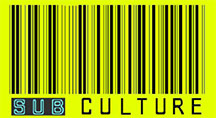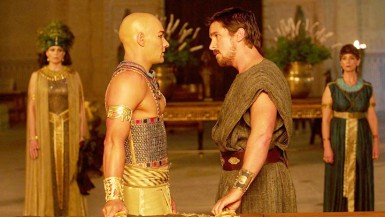If you’re Christian, not white, easily offended or all of the above, Exodus: Gods and Kings is probably not the movie for you.
I’ll admit that when I went to see the movie earlier this week, I had gone in with mild distaste and a smidgeon of bias. You see, the internet had been abuzz with harsh criticism for Ridley Scott’s US$140 million movie on the biblical figure Moses and I had glanced through a review or two before watching the movie – hey, my money was on the line here, after all.
From my browsing, it was pretty clear that the main issue was the casting of whites to play Egyptians.
 For one, the movie’s lead role of Moses went to Christian Bale (Hey Batman!), the green-eyed, brown-haired British boy. The other roles went to equally pale actors such as Australian Joel Edgerton (who played Ramesses II), Idaho-born Aaron Paul (Joshua), and Manhattan lady Sigourney Weaver (Queen Tuya).
For one, the movie’s lead role of Moses went to Christian Bale (Hey Batman!), the green-eyed, brown-haired British boy. The other roles went to equally pale actors such as Australian Joel Edgerton (who played Ramesses II), Idaho-born Aaron Paul (Joshua), and Manhattan lady Sigourney Weaver (Queen Tuya).
Now, as we all know the internet is infamous for blowing things out of proportion (take Kim Kardashian’s ‘talent’, for example) so I thought it would be best to see the movie for myself and go in with as open a mind as possible. So, there I was in a completely empty Princess Movie Theatre on Monday afternoon to see the high-budget Exodus film.
I’ll give it to the internet on this one; its call on whitewashing had been on point.
The movie begins and from the inception we see clearly white people trying to appear like the exotic Egyptians. I’m sorry Ridley, but no amount of spray tan or gold spray could hide the fact that your cast was obviously not Egyptian in any shape or form – even with all the eyeliner that was piled on them.

Oh, don’t get me wrong, readers; there are blacks in the movie and some persons exotic enough to pass off as Egyptians without too much uproar; for example, minor roles such as Moses’ wife, Zipporah (Spanish actress Maria Valverde), Bithiah (Israeli-Arabian Hiam Abbass), High Priestess (part-Indian Indira Varma) and Ramesses’ wife Nefertari (Iranian Golshifteh Farahani).
Oh yes, there are blacks in the movies; however, not a single black person in the film was given a speaking role. Instead, these persons, numbering more than two dozen, all act as slaves or rebels, doomed to the background to be as unimportant as furniture. The camera doesn’t focus on any of them for too long and there are moments in the movie when horses get more air-time than the blacks.
Some of you may be wondering, “What’s the big deal anyway with whitewashing?” and follow that up with, “Would you go watch a movie with unknown Egyptian actors?”
This line of reasoning is understandable and similar to that of director Ridley Scott. In an interview with Variety Magazine (how ironic, seeing that his film had none), Scott said that a movie with such a big budget required big names to get butts in those cinema seats.
He said, “I can’t mount a film of this budget, where I have to rely on tax rebates in Spain, and say that my lead actor is Mohammad so-and-so from such-and-such.” He went on, “I’m just not going to get it financed. So the question doesn’t even come up.”
Okay Ridley; I’ll agree with you there. Many of us are guilty of going to watch movies because of the big names associated with them. I agree; I’m not going to spend $1,500 for the ticket along with $2,000 in snacks – a girl’s got to eat – to watch a movie by some unknown actor. Yes, I need value for my money.
However, my agreement with Scott’s reasoning ends there.
Yes, you needed a big name actor such as Christian Bale to play your lead to draw in throngs of people. However, what about the rest of your cast? Is Joel Edgerton, who’s still relatively unknown and Sigourney Weaver, who most young people probably won’t recognize, really necessary? Are any of the other actors with speaking roles in your movie capable of drawing droves of people to the cinema? I highly doubt it. Could they be replaced with other actors with the same results? I think so.
Also, perhaps Scott missed the memo of just how diverse Egypt was; I’m no historian but I do know many cultures were drawn to Egypt due to its great agricultural system because of its proximity to the Nile River. So, Scott’s depiction of Egyptians as white un-exotic persons is both offensive and historically inaccurate.
Speaking of historical inaccuracies, the movie is filled with them.
For one, the movements and speech of many of the actors seemed out of place with the era. No, no, I did not grow up in Ancient Egypt. However, I’m really sure that words such as “imply” and “interrogation” did not exist as early as 1300 BC. Also, I’m very sure that Egyptians didn’t slip into English accents as they carried on conversations.
And Christians? You know how at the beginning of almost every Lifetime film there is something that says “based on a true story”? Well, this is sort of the same thing.
Scott’s retelling of the Exodus story is an adaptation of the Moses’ story and not the Moses’ story you may have read in the Bible or seen elsewhere. So, for example, God is not just a disembodied voice talking to Moses but rather a young human boy (Isaac Andrews). Might I add, this young boy is not only white but also had a slight British accent.
Also, remember the infamous parting of the Red Sea? Well, it happens but not just the way you would have imagined it. I’ll admit, I was really disappointed when the water simply receded for the Hebrews to cross over instead of parting with huge walls of water on either side of them.
Also for Christian parents, consider seriously before watching this movie with your children. For many persons, Exodus may just be another entertaining movie that doesn’t change their perspective at all on religion. However, for others who are not as familiar with the story as it is written in the Bible, the movie may become their new idea of how things went down.
After all, you may find your children becoming sympathetic to the bad guy Ramesses after watching him weep over the dead body of his first-born son. It happened to me and even though I knew how the story would end, I couldn’t help but root for Ramesses and understand a bit of where he was coming from when he tore after those Hebrews in a spray-tanned rage.
Now – finally – there are pros with the movie. That huge budget was put to use with all of the special effects. There were some truly breath-taking scenes in the movie; we see huge monuments, miles upon miles of beautiful Egyptian territory in vibrant colours and some pretty good costuming.
Particularly beautiful were the recreations of the 10 plagues brought upon the Egyptians; from the appearances of the crocodiles that leave the waters red with the blood of fishermen to the scene in which the breaths are stolen from the bodies of the Egyptian first-born sons, I am on the edge of my seat. Add 3D to all of that and you’ve got a truly riveting 20 minutes.
However, more than a bit of special effects was needed to save this 154-minute disappointment; this movie needed a miracle.
Final consensus: Entertaining enough but not worth re-watching
Do you feel lucky, punk? Then drop me a line at thatpopculturechick@gmal.com









